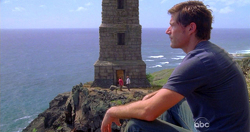 Last week’s episode of Lost was a Jack episode, so you know what that means: it’s Daddy issues time! I don’t know about you, but I thought Lost had dropped this thread, never to pick it up again, sometime around when Locke and Sawyer strangled Locke’s dad with some rusty chains in the Black Rock.
Last week’s episode of Lost was a Jack episode, so you know what that means: it’s Daddy issues time! I don’t know about you, but I thought Lost had dropped this thread, never to pick it up again, sometime around when Locke and Sawyer strangled Locke’s dad with some rusty chains in the Black Rock.
“Lighthouse,” however, got me thinking that not only are the Daddy issues back at center stage now in season six, but that maybe they’ve been the main theme of the show all along. The way I see it, Jack’s quest to resolve his relationship with his possibly-evil ghost dad—whether by reconciling with him or destroying him—will resolve his faith vs. science issues, his fate vs. free will issues, and his relationship with Jacob and the Man in Black.
Maybe it’s just me, but have any of the rest of you noticed the apparent lack of dads in this final season of Lost? Back in seasons one and two, ghost-Christian Shephard was playing hide-and-go-seek with his son; Kate decided she couldn’t bone Sawyer because he reminded her too much of her own dad (whom she murdered); Sun was butting heads with her dad while Jin was trying to forget about his; Claire was being shut out by her baby-daddy; Locke got his kidney—and heart—cut out; and so on and so forth. The third season brought us Ben’s own special brand of Daddy issues, but, by the fourth, they were basically gone and forgotten. (Well, except for Miles’s little interlude with his bad dad, although that storyline didn’t seem terribly developed to me.)
Now, in this final season, dads are being talked about constantly, yet we’ve seen very few. LA X saw Jack dealing with his father’s death, yet, once again, the body was missing in action. What Kate Does saw Kate back in her fugitive mode, likely fleeing punishment again for killing her father, also unseen. The same episode saw Claire giving birth to Aaron without his daddy at her side, and even his almost-adoptive father ran away before Aaron could be born. In The Substitute, we saw a picture of Locke’s dad, but not the man himself, making us wonder if he and Locke are truly buddies in the sideways Universe and how that affected Locke’s early life. And, as I said in last week’s Open Thread, Christian Shephard haunted every second of Lighthouse, though we never got to see the man in the flesh (or creepy spectral form, as it were).
The main theme, then, seems to be not “Daddies” but “missing daddies.” We got the impression from this week’s flash sideways that Jack himself was turning into one of these, too.
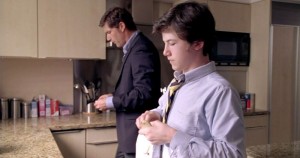
The cats in the cradle and the silver spoon...
What makes Lighthouse different from all the other episodes I referred to above is the point of view. If most of Lost’s father-oriented episodes are Oedipal (but without the mom-sex), most of those look at the Oedipus story from Oedipus’s point of view. Jack wants to kill/get over his dad; Locke has to kill HIS dad; Sawyer wants to kill Locke’s dad as a surrogate for HIS dad. Sun wants to destroy her dad; Jin metaphorically killed his dad by pretending he was dead; Ben and Kate wanted to kill their dads and did it. I recently re-watched Flashes Before Your Eyes, and there’s even some indication that Desmond’s desire to win Penny’s dad’s boat race is just a way for him to metaphorically “defeat” his own father, who left him to raise his siblings by himself. Looks like everyone hates daddy.
Lighthouse, on the other hand, focuses on the father-son dynamic from the father’s point of view, which is something we haven’t really seen explored since the Others took Walt from Michael back at the end of season one. In this episode’s flash sideways, we see that the father-son conflict isn’t necessarily a fight between Evil Dad and his Good But Insecure Son. In this episode, yes, Jack was partially to blame: he sees his son only one weekend a month, he seemed not to be paying any attention to his son’s feelings or desires, and there was some indication that he might have put too much pressure on David to succeed where Jack hadn’t. But what made this episode different from so many other Jack episodes—and from many other TV shows—is that the son is clearly somewhat at fault, as well. As Jack’s mom says, just as Jack cast his father in his own mind as an intimidating demon, Jack’s son is doing the same. And, just as Jack is a sympathetic human character despite his self-centeredness and angst, maybe Christian Shephard was a sympathetic human being, too. I think alterna-Jack came to that conclusion in this episode: that maybe his father, while not nearly perfect, was doing the best that he could.
So there’s today’s psychoanalysis—but what does this all have to do with faith and science and free will and fate and so on? Well, here’s my theory: my theory is that Jacob is now being presented as not only a God-figure but a father-figure, and that Jack is going to turn out—metaphorically, of course—to be his Son. Smokey, meanwhile, will turn out to be another Son-figure—the spurned son, or Lucifer—to Jacob, too.
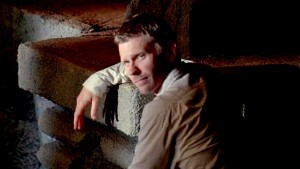
Just like your dad, Jacob spends his free time tinkering with the pool.
I present to you exhibit A: alterna-Dogen’s speech to Jack at the end of the episode. They’re at an audition—their sons are, appropriately, “Candidates”—when alterna-Dogen says, “It’s hard to watch and not be able to help.” And: “Your son has a gift.”
Something about the way he said this makes me wonder if alterna-Dogen has some of his memories of being regular-Dogen, and that he (or the writers) are insinuating that the Others’ job was to watch Jacob’s Candidates but not help them. But even if those lines don’t apply to the Others, they clearly apply to Jacob: The contraption in the Island’s lighthouse shows that Jacob was, like a parent, watching Candidates like a parent watching over his kids. Jack, being a Candidate, has some kind of “gift,” yet, beyond one little touch, Jacob was not “able to help” him during the early parts of his life.
At the end of the episode, Jacob talks to Hurley about two types of people—the type that, like Hurley, you can just order around, and the screwed-up kind, like Jack, that you need to let flounder so they can find their own way. I might be crazy, but it sounded the way a parent would talk about their kids. Like: “Hurley, you’re the good one. You do what I say. Jack’s a good boy, too, but he’s a late bloomer. He needs some time to grow up for himself and figure out how special he is.”
Jack, of course, has a temper tantrum when he finds out that he’s had this nice god-figure caring about him all these years. I read a comment—I think it was at the AVClub; I don’t remember—where someone was complaining that, by destroying the mirrors, Jack was acting like a whiny 14-year-old boy instead of a nearly 40-year-old man. I agree completely—and I think this was by design. The show was suggesting that Jack freaked out because all of his beliefs about his place in the world—which were likely formed when he was fourteen or younger—are now being demolished, one-by-one. We are meant to think, “Aha! Jack is having a hard time having faith in good-father Jacob and in himself as an agent of free will because he was taught by his bad-God father Christian that he shouldn’t have faith in anything and that he was fated to fail.”
[Aside: I was going to say that this was another example of TV insinuating that all atheists lack belief and believe in science because we all had bad childhoods boo-hoo. But, then, Jack’s mirror image, Locke, didn’t end up any better off than Jack did. Both Jack and Locke had not-so-nice childhoods and not-very-nice dads, yet their reactions were polar opposites. Jack clung to science and spent his life fixing everything to prove he was “better than” even though he secretly knew he would never measure up, while Locke took up his Island-based religion and clung to the hope that he was fated to be “special-er” than anyone else. But let’s not beat around the bush here: both characters are clearly fucked up. So, I thank you, Lost writers, for being equal-opportunity offenders. Atheism and religion: both bad when adopted for the wrong reasons. I guess I don’t mind that moral.]
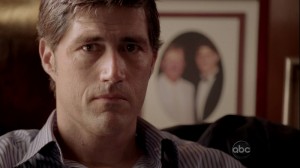
Alterna-Jack face.
If Jacob is a good-father figure, then what about Smokey? Personally, I think we have to start seriously considering the fact that Smokey might be Jacob’s kid, either literally or figuratively. Last week some of you were talking in the comments about how “the rules” were to some kind of god-game—but what if “the rules” are rules that Dad made for his rebellious son? Consider:
JACOB: “Smokey, you’re grounded! No leaving the Island for another 2000 years.”
SMOKEY: “Aw, I hate you, Dad! Next time I get a chance, I’m so gonna kill you! Then you’ll be sorry. You’ll all be sorry!”
(Smokey storms off, clackety-clacking like an emo taxi-cab.)
JACOB (to Richard): “Kids, right?”
And consider last week’s episode:
SAWYER: “What is this? What are these names?”
SMOKEY: “Oh, my dad wants these people to protect the Island or something. Whatever, like this shithole needs protecting. Ugh, my dad is such a phony. He’s like, ‘I’ll love you no matter what, son,’ but then he goes around pushing everyone to do what HE wants. I swear, the first chance I get, I am so out of here. Hey, you should come with me! We’ll have our own cars, stay out as late as we want… What do you say? You in?”
SAWYER: “Well, hell yes, homes!”
The only question is, if Jacob is the “good dad” to Smokey’s “bad son,” then why did Jacob piss on Ben when he asked for some attention and love in The Incident? A nice dad wouldn’t snark, “What about you?” would he? I still can’t figure that part out.
Other random notes on Lighthouse:
- By the way, WTF is Dogen wearing on his left hand? Was he in a goth band before he joined the Others? (I can’t find a good picture of it, but, seriously, look at his hand! The Temple Others’ costume choices are a bit… bizarre.)
- “I came back because I was broken. And I was stupid enough to think this place could fix me.” Aww, poor Jack! The only thing the Island can’t fix… is a broken heart.
- Hurley knows a way through a secret tunnel to get to the lighthouse? Hit it, hippie guy from Avatar: The Last Airbender!
http://www.youtube.com/watch?v=Mdg0PaeUN70
- Oh, no! The Temple is going to be attacked, and Miles is at the Temple! (And I guess Kate is going to show up there soon, too, but, uhhhhh whatevs.) No, don’t kill Miles, show! Not before we know what the point of his character is!
[What do YOU think about Lost’s daddy issues? What is the relationship between Jacob and Smokey, anyway? And where does GhostChristian fit into this? Let loose in the comments.]
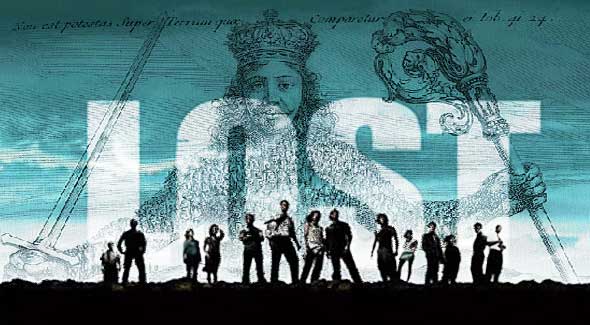
I made a long-ass comment on the open thread, just this morning (so now that this post is up, it probably won’t get much attention) that was largely about daddy issues, and how the characters don’t seem to have them, in alterna-world. The one example I left out was Sawyer, who doesn’t seem to be a con man in New-04; he tells Hurley, “You shouldn’t tell people you’re rich: someone could try to con you out of it” – but he doesn’t. I think if he hadn’t written that letter as a kid, he would’ve moved past it, like his uncle (I think) says.
Basically, the long-and-short of what I wanted to say is that I think Jacob CAUSED all of their Daddy issues, in order to better manipulate them later. It makes sense, b/c Jacob in the Bible is fraught with Daddy issues himself. He tricks his father to gain his brother’s inheritance… but it should be pointed out that his dad always showed preference to the brother, as firstborn, despite the fact that they were twins (so only “firstborn” by a matter of minutes) which could result in some serious bitterness.
OH! OH! also, in reading up a little on Jacob, I was reminded that his mother, Rebekah, had been married for *20 years* before she conceived Jacob & Esau. MAYBE the island represents the mother figure (the healing spring, for example) and, as in the biblical story, Jacob is the island’s favorite. If the island is Rebekah, that would explain why it is so difficult for women to conceive and give birth on the island.
Also, if the island is Rebekah, then my new theory is that Christian is Isaac. This would explain why he so often seems to help Smokey/Esau (his favorite,) and also why he seems to be the embodiment of flawed but persistent paternity. Also the whole “I speak for Jacob” thing – typical parental presumptuousness ;0)
I think this is why we’re coming back to Daddy issues from the Daddies’ perspective (in some cases.) I almost think that, ultimately, this is going to be a redemptive narrative chronicling Christian/Isaac/everyDad’s journey. In much the same way as we were all fooled through A New Hope and The Empire Strikes Back into thinking that Star Wars was Luke’s story when it was really Vader’s, I think this tale will end up finding out that Lost isn’t REALLY about any of the children, but about their fathers, about Christian, THE father, and how their stories can be told (and how they can be judged) by the influence they have/had on their children.
So, yeah, I don’t think Jacob/MiB are father/son. I think they’re siblings, counterparts, answering to a higher authority: both the island (mother) and Christian (father.)
@genevieve: LOVE IT! A fascinating take.
A few comments:
It’s funny… I know George Lucas always says “The Star Wars saga is ANAKIN Skywalker’s story!” But at the time of the original film, and moving into ESB, I don’t think that was the case. STAR WARS went through SO many permutations in the early years that I think it evolved quite a lot over time, for good and bad. I mean, in the first film, Darth Vader isn’t all that interesting a character — he’s the “villain,” yes… but the only real development you get from him is that he was trained by Obi-Wan. Usually all he does is look (and sound) threatening, but he takes back seat to Tarkin. Compare all that to ESB, in which he’s the Emperor’s right-hand man, commanding the Imperial Navy, and so on. And finally we get to JEDI in which he’s hugely important. We ended up with a (mostly) well-crafted original trilogy… but I think a lot of that was just by accident. A happy accident caused by the evolution of the movies over the years.
What does that mean to Lost? Well, I’m still grappling with that — but the big point is about the evolution of the story. I can only think that while the broad strokes of Lost are the same, the specifics of its “meaning” have changed since it started — hell, not even that long, they’ve changed over each season. My hope is that Lost, like the original SW trilogy, settles on a generally cohesive meaning, a “whole,” and that it all makes sense when taken as a piece. While they’ve had to change details both due to things in their control (making Ben Linus the big “villain” when he was originally supposed to be on for only a three-episode arc!) and outside it (biggest example would be Malcolm’s growth spurt and puberty making Walt a non-factor on the show when he was originally supposed to be hugely important), I think those changes have forced them to really think about what’s important to the larger story.
(Forgive me, it’s early Monday morning for me. I’m rambling.) ANYWAY… before going off on this tangent, I meant to say that while Christian was crucial to the story in the early years… I feel he’s been so absent since S3 that it would make this story less meaningful if ultimately it was “about” him. Sure, he’s shown up as a ghost on occasion… but only once to Jack. I feel like without flashbacks to Jack trying to get along with his father, the emotional resonance the audience might have to Christian being the “Darth Vader” of the show goes out the window. Remember, Vader’s screen time only INCREASED with each movie… while Christian’s has decreased. He’s an unseen presence. Maybe to us, the hardcore fans, that’s not an issue. But for most viewers, who don’t know everything about the show and post comments on Overthinking It after each episode… I just don’t know how cathartic it would be for Christian suddenly to become hugely important. It’s Jack’s relationship TO him that is ultimately crucial — and something that everyone can get on an emotional level — but again, I don’t think he can be Darth Vader.
As for the island being “Rebekah,” metaphorically speaking: it’s still all locked up somehow in the destruction of the Tawaret statue on the beach, an event we HAVE to see by the series’ end (don’t we?). We know it was originally intact, having seen it in S5; presumably it was intact at some point during the Dharma era in the 70s (think of the Ankh necklaces a few of the characters wore); and at some point after it was destroyed. We also know that characters were able to give birth on the island before, even during the Dharma era… and yet by the 90s, something’s gone wrong and pregnancy becomes deadly. Given that Tawaret was a fertility god… the destruction of the statue HAS to be related. (It remains to be seen which was causative: did the statue’s destruction cause the infertility, or did something happen to cause the infertility which led to destruction of the statue?)
Finally, are there other readers who live in Los Angeles? Lost was the focus this Saturday night at the Paley Television Festival, an annual event where the creative and production staffs of acclaimed TV series speak for a couple hours, do a Q&A, and tend to show either new or “classic” episodes of their shows at the end… (I’ve been to a few in years past, and it really is an incredible time) There are write-ups on the event online (INCLUDING SPOILERS, so tread with caution!), but it sounds like it was pretty amazing — Darlton and the rest of the writing staff spoke; directors; Terry O’Quinn, Michael Emerson, and a few other actors (the rest of the cast has appeared in previous years). Wish I could have gone…
(Thw festival is still going on now — give it a look if you’re interested, there’s another week or two of events:
http://www.paleycenter.org/paleyfest2010/ )
I TOTALLY thought of that “secret tunnel” song when I saw the episode, too, Mlawski! Ah, I love that cartoon…
Anyhoo, I think any points Jack regained during he episode through his alterna-timeline died off for me when he smashed the mirrors. I saw it coming a mile away, but I guess the fourteen-year-old thing was, indeed, what I thought and, alas, he’s very guilty of it all the friggin’ time.
To propose an answer to one of your questions, the one about Ben and Jacob. I don’t think Ben himself was ever a Candidate. He has been important, but I don’t think Jacob is his “father” and so Jacob’s being a good one TOWARD BEN is a non-issue. Since Ben isn’t his kid, Jacob can be snarky at him. Because if Jacob was father-figure for *everybody* on the Island, the random deaths wouldn’t have occurred, I don’t think- the fire-arrows, for example. He would have prevented them somehow, or at least expressed interest in those deaths at some point. So the ones he’s really “supposed” to be “nice” to are the Candidates.
OR
Maybe Ben is a Candidate, but Jacob doesn’t really want him to be. In this sense, Ben is like an UNfavored son, and Jack is a favored one. By that, I mean Jacob clearly shows preference for one or more of the other Candidates and kind of ignores everything Ben does for him or how good he is, etc. Like an UNprodigal son, of sorts. Ben keeps trying to do right by and impress Jacob, but all for naught, which creates in him the narcissism that made him ask the question, “What about me?” in the first place- and it’s reinforced with Jacob’s response of, “What *about* you?” And of course, the relationship between Ben and his biological dad parallels his with Jacob very, very nicely. (I’m reminded of the Alanis Morissette song, “Unprodigal Daughter” now. Look up the lyrics to it- it kind of fits Ben, gender aside. I’d post a link myself, but the last couple times I tried posting a link on the site, the entire comment disappeared. Sorry.)
I’m no psych major, but, if I remember correctly, while Sun clearly has daddy issues, its called the Electra Complex when the offspring is a female and the roles are reversed. So the daughter wants to “kill” the mother, and instead “desire” her father. This could be true if we consider the 180 Sun does in Season 4/5 (I don’t remember) where she becomes creepy evil company owner and approaches Widmore to kill Ben for the death of Jin. This was pretty un-Sun-like and it reminded me of her mob boss father.
Whatever, Freud was on coke.
If there’s one Lost discussion to read this week besides this one, Jeff Jensen’s new column at ew.com really shines. He delves deep into all the connections between “Lighthouse” and both Alice in Wonderland books… and comes up with some pretty insightful finds.
For example, when Jack is talking to his “alterna-son” about the Alice books, and starts to talk about ‘Kitty and Snowball’ but gets interrupted by his son before he can continue… isn’t it interesting that Kitty is all black and Snowball is all white? And that one is all good, and the other is all bad?
Another of the other interesting connections: there’s a character in the book that spills ink on his face… compare to Jacob’s seemingly random line to Hurley: “You’ve got ink on your face.” (That character, ‘Bill the Lizard,’ was tasked with keeping Alice on track…)
All in all, he makes a pretty interesting prediction as to how the show is going to end, assuming the writers are sticking pretty closely to the Alice script — it’s hard to see how they aren’t this season, esp. with the “two worlds” stories we’re getting. Good stuff.
http://www.ew.com/ew/article/0,,20313460_20347892,00.html